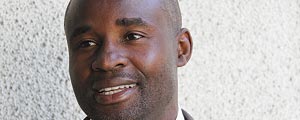
OUTSPOKEN Zanu PF Hurungwe West MP Themba Mliswa said the biggest threat to the country’s economic revival was pervasive corruption in the public sector and not sanctions as widely peddled by those in the corridors of power.
BY FELUNA NLEYA STAFF REPORTER
Speaking at a debate series organised by Sapes Trust in Harare on Thursday, Mliswa said Zimbabwe had survived long under sanctions, but corruption by public office bearers was the main catalyst debilitating the economy of the southern African country.
Mliswa was responding to one of the delegates’ contribution that the clandestine dealings to beat sanctions were promoting corruption.
“I have said it and will say it again that Zimbabwe’s biggest threat at the moment is corruption and not sanctions,” Mliswa said. “We must separate the issue of sanctions and corruption. It is clear that sanctions have been overtaken by corruption and I say this with confidence, without fear or favour that Zanu PF won the elections while sanctions were there.”
Mliswa said it was important for the country to ensure that all national resources are accounted for if Zimbabwe was to emerge from the current economic quagmire. “It is time for rebuilding the economy after over a decade of economic decline and making sure that the resources are accounted for,” he said. “The diamonds which have been alleged to be smuggled have nothing to do with the sanctions but the criminal elements.”
Mliswa said ZimAsset, which has been peddled by Zanu PF as the country’s economic panacea, was there to address the issue of sanctions while Zimbabweans should deal with the issue of corruption.
“The question is are the diamonds a curse or a blessing we must be very clear on that and I speak boldly about that without fear or favour and that is why I talk about the minister with a bank, was is a coincidence that he made money when he was minister of mines too,” said Mliswa, in an apparent reference to Minister of Transport Obert Mpofu.
- Chamisa under fire over US$120K donation
- Mavhunga puts DeMbare into Chibuku quarterfinals
- Pension funds bet on Cabora Bassa oilfields
- Councils defy govt fire tender directive
Keep Reading
Mpofu, who was the Minister of Mines before last year’s Cabinet reshuffle, could not be reached for comment yesterday.
“I have not accused him of stealing, I have simply asked him to account for his wealth and I think it could do him good by saying this is how I got rich, the source of money to buy a bank, the source of the money to acquire the properties he allegedly owns in Bulawayo and Victoria Falls and so forth.”
Mliswa also supported the Cabinet directive on a salary cap for parastatal bosses announced by the Minister of Finance and Economic Development Patrick Chinamasa. “I think it’s pretty clear that when one is bleeding you need to stop the bleeding and if the bleeding has been stopped the doctors can then assess if there is any need to operate or not so allow the bleeding to be stopped but that is not the end result,” Mliswa said.
Speaking at the same meeting Mbizo MP, Settlement Chikwinya urged President Robert Mugabe to deal decisively with the issue of corruption.
“We have been told of ministers who have been involved in these dealings and to me it is whistle blowing but there is no action being done,” Chikwinya said.
“If three people or five people are going to be arrested who are in the executive, cabinet ministers or even in parliament there will be a total paradigm shift in how other individuals are viewing themselves.”
An Afrobarometer report released late last year says Zimbabwe is the third most corrupt African country. It says corruption in Zimbabwe stands at 81% with Nigeria and Egypt at 82%.











